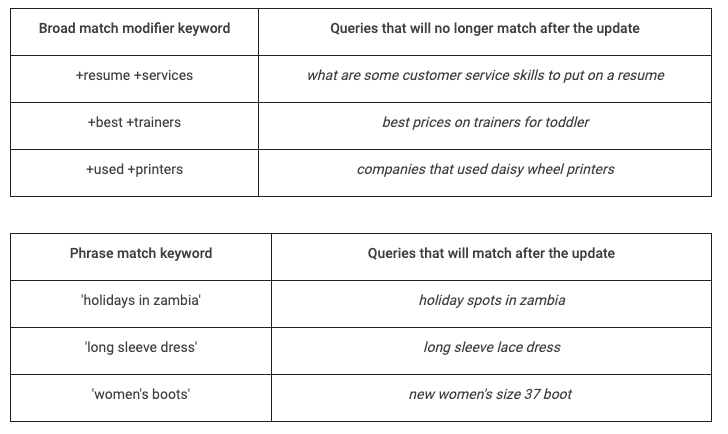In February this year, Google announced they will be phasing out their Broad Match Modifier keywords. This is a new change that will be gradually introduced until July, when Broad Match Modifier will be completely phased out. It has triggered mixed opinions from advertisers and brought a bit of uncertainty as to how this would impact website traffic and conversions. In this blog, we want to clarify what this change really means and how you can prepare.
Current match types
The current phrase match types until February include:
- Exact Match – this would only show your ads for specific phrases with the exception of functional words, conjunctions and misspellings
- Broad Match – these keywords would enable your ad to show, as long as the search query has a similar meaning
- Phrase Match – these keywords are similar to broad match, but the order is crucial. Phrase match also considers the intent of the search query
- Broad Match Modifier – with this option you can select keywords that are necessary for your ad to show, however, the order of them doesn’t matter. These will be phased out by July and some features will become part of Phrase Matching
What does this change mean?
According to Google, Phrase Match will cover Broad Match Modifier (BMM) traffic, but with respect to word order and search intent. This means that your ads will be narrowed down to more specific keywords, like the below example:

As we can see here, updated phrase match will no longer show your ad for search queries with the same keywords, where their order changes meaning. Let’s take a look at a few more examples:

Updated phrase match will still show your ad to search queries with similar keywords. But it will exclude queries with a different context or where keyword order changes intent.
What does this mean for you?
Ultimately, Google is looking to streamline ad campaigns and provide a more targeted approach to keywords. Currently, however, it’s quite difficult to predict if this will result in increase or decrease in traffic. It’s likely that there will be businesses on both ends of the spectrum, depending on their ad strategy up to this point. If you’ve been getting more visitors from Phrase Match, this could result in even more clicks and conversions. On the other hand, if Broad Match Modifier got you the most traffic, it could decrease as the change is introduced.
What can you do to prepare?
Firstly, keep an eye on your recommendations and adjust them accordingly by adding new keywords and removing duplicates. Traffic could fluctuate during this period, so monitor it regularly and adjust your spend as required. Continue to use negative keywords to filter out bad traffic from phrases you don’t want to target. If you’re worried about reduced traffic, you could also consider using Broad Match keywords with Smart Bidding. This automated bidding could make it easier for you to find relevant queries and set the right bid for each of them.
Contact us for a free assessment!
If you have any concerns or confusion regarding these new Broad Match Modifier changes, contact us for a free assessment! We will look at your current Adwords strategy and make suggestions on how you can prepare for the changes ahead.










